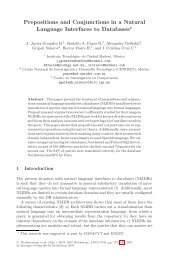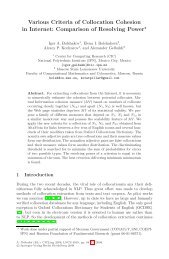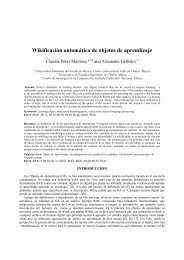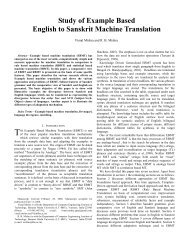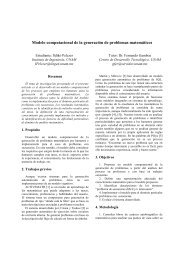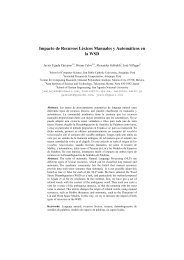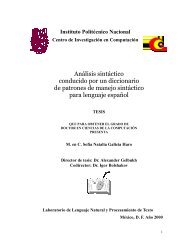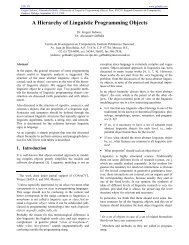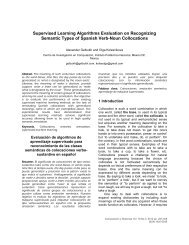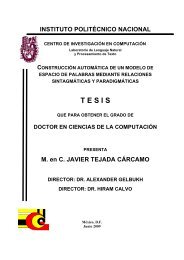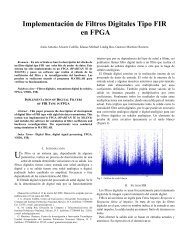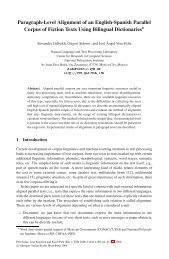Advances in Artificial Intelligence Theory - MICAI - Mexican ...
Advances in Artificial Intelligence Theory - MICAI - Mexican ...
Advances in Artificial Intelligence Theory - MICAI - Mexican ...
Create successful ePaper yourself
Turn your PDF publications into a flip-book with our unique Google optimized e-Paper software.
16 Hui Z., Sikun L.<br />
We say an <strong>in</strong>terpretation I is co<strong>in</strong>cident with the doma<strong>in</strong> knowledge if it satisfies<br />
conditions follows:<br />
1. For every n-tuple of constants (c 1 ,c 2 ,…,c n ), (c 1 ,c 2 ,…,c n )∈P I if and only if<br />
P(c 1 ,c 2 ,…,c n ) is <strong>in</strong> the doma<strong>in</strong> knowledge;<br />
2. for every 2-tuple of constants (a,b), (a,b) ∈R I if and only if R(a,b) is <strong>in</strong> the doma<strong>in</strong><br />
knowledge.<br />
Let Γ be a set of primitive task formulas, {x 1 ,x 2 ,…,x n } be the set of all free variable<br />
that occur <strong>in</strong> the task formulas <strong>in</strong> Γ. An <strong>in</strong>terpretation I and an assignment<br />
(x 1 /c 1 ,x 2 /c 2 ,…,x n /c n ) is said satisfy Γ if (α(x 1 /c 1 ,x 2 /c 2 ,…,x n /c n )) I =1 for every formula α<br />
<strong>in</strong> Γ. A task formula set Γ is said be not satisfiable if there is no <strong>in</strong>terpretation I and<br />
assignment (x 1 /c 1 ,x 2 /c 2 ,…,x n /c n ) satisfy it, else be satisfiable.<br />
In rema<strong>in</strong> of the paper we only consider the <strong>in</strong>terpretation that is co<strong>in</strong>cident with<br />
the doma<strong>in</strong> knowledge and assumes that the ability specification is satisfiable.<br />
Def<strong>in</strong>ition 2.5(accomplishability of primitive tasks) Let Γ be the ability<br />
specification and α a primitive task. Let {x 1 ,x 2 ,…,x n } be the set of all free variables<br />
that appear <strong>in</strong> the task formula <strong>in</strong> the set Γ∪{α}. We say that α is accomplishable if<br />
for every <strong>in</strong>terpretation I and every assignment (x 1 /c 1 ,x 2 /c 2 ,…,x n /c n ) of (x 1 ,x 2 ,…,x n )<br />
that satisfy Γ, we have (α(x 1 /c 1 ,x 2 /c 2 ,…,x n /c n )) I =1.<br />
Now we will give out the concept of accomplishable task. The concepts of strategy<br />
and realization used are same as those <strong>in</strong> [2].<br />
Observe that development preserves the basic structure of the formula. I.e.<br />
1. assume α 0 =∀P(t 1 ,t 2 ,…,t n ).β (or α 0 =∃P(t 1 ,t 2 ,…,t n ).β), then for every realization<br />
R= of α 0 , α i must has the form of ∀P(t 1 ,t 2 ,…,t n ).β i (or<br />
∃P(t 1 ,t 2 ,…,t n ).β i )) (1≤i≤n). For every assignment (t 1 /c 1 , t 2 /c 2 ,…,t n /c n ) the sequence<br />
of β i (t 1 /c 1 , t 2 /c 2 ,…,t n /c n ), denoted by [P: t 1 /c 1 , t 2 /c 2 ,…,t n /c n ] R, is an realization of<br />
β( t 1 /c 1 , t 2 /c 2 ,…,t n /c n ).<br />
2. Assume α 0 =∀R(t,y).β (or α 0 =∃R(t,y).β), then for every realization<br />
R= of α 0 , α i must has the form of ∀R(t,y).β i (or ∃R(t,y).β i )<br />
(1≤i≤n) and for every constant b the sequence of β i (y/b), denoted by [R:y/b]R , is<br />
an realization of β(y/b).<br />
3. Assume α 0 =β∧γ(or α 0 =β∨γ), then for every realization R = of α 0 ,<br />
α i can be expressed as β i ∧γ i (or β i ∨γ i) (1≤i≤n) such that and<br />
, denoted by p(R) and r(R), are realizations of β and γ respectively.<br />
4. Assume α 0 =β→γ, then for every realization R = of α 0 , α i must<br />
has the form of β i →γ i (1≤i≤n) . and denoted by<br />
a(R) and c(R), are realizations of β and γ respectively.<br />
Def<strong>in</strong>ition 2.6 We say that an realization R= of a task formula<br />
α 0 is successful if one of the follow<strong>in</strong>g conditions holds:<br />
1. If α 0 is an atomic task formula, or α 0 =¬α and α is an atomic task formula(both<br />
imply m=0), and α 0 is accomplishable;<br />
2. α 0 =∀P(t 1 ,t 2 ,…,t n ).β and [P: t 1 /c 1 , t 2 /c 2 ,…,t n /c n ] R is successful for every assignment<br />
(t 1 /c 1 ,t 2 /c 2 ,…,t n /c n ) such that P(c 1 ,c 2 ,…,c n ).<br />
3. α 0 =∃P(t 1 ,t 2 ,…,t n ).β and there is an assignment (t 1 /c 1 ,t 2 /c 2 ,…,t n /c n ) such that<br />
P(c 1 ,c 2 ,…,c n ) and [P:t 1 /c 1 ,t 2 /c 2 ,…,t n /c n ] R is successful;



